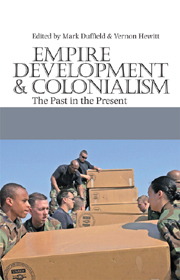Book contents
- Frontmatter
- Contents
- Acknowledgements
- Notes on Contributors
- Introduction
- 1 The Exceptional inclusion of ‘Savages’ & ‘Barbarians’
- 2 Empire, International Development & the Concept of Good Government
- 3 Empire: a Question of Hearts?
- 4 ‘Conflict-Sensitive’ Aid & Making liberal Peace
- 5 Development, Poverty & Famines
- 6 Plain Tales from the Reconstruction Site
- 7 The International Politics of Social Transformation
- 8 Liberal Interventionism & the Fragile State
- 9 Freedom, Fear & NGOs
- 10 Theorising Continuities between Empire & Development
- 11 Spatial Practices & Imaginaries
- 12 Decolonising the Borders in Sudan
- 13 ‘Individualism is, Indeed, Running Riot’
- Index
6 - Plain Tales from the Reconstruction Site
Spatial Continuities in Contemporary Humanitarian Practice
Published online by Cambridge University Press: 05 February 2013
- Frontmatter
- Contents
- Acknowledgements
- Notes on Contributors
- Introduction
- 1 The Exceptional inclusion of ‘Savages’ & ‘Barbarians’
- 2 Empire, International Development & the Concept of Good Government
- 3 Empire: a Question of Hearts?
- 4 ‘Conflict-Sensitive’ Aid & Making liberal Peace
- 5 Development, Poverty & Famines
- 6 Plain Tales from the Reconstruction Site
- 7 The International Politics of Social Transformation
- 8 Liberal Interventionism & the Fragile State
- 9 Freedom, Fear & NGOs
- 10 Theorising Continuities between Empire & Development
- 11 Spatial Practices & Imaginaries
- 12 Decolonising the Borders in Sudan
- 13 ‘Individualism is, Indeed, Running Riot’
- Index
Summary
Introduction
The idea of a ‘pure’ or natural disaster is a pervasive one. The occurrence of an ‘Act of God’ appears to be the one instance where international intervention is beyond criticism: the blamelessness of the victims translates into an ethical imperative for action on the part of the ‘international community’ to alleviate the resultant suffering (Edkins 2000). While it is possible to point to many instances of critique of political interventions (Mamdani 200 7; Pugh 2005; Chandler 2006) and others who criticise the efficacy or appropriateness of certain modes of disaster relief (Duffield 1991; Edkins 2000; Keen 1994; De Waal 1997), there are few authors who have problematised the basic premise that the international community has a responsibility to provide assistance to those affected by a natural disaster (Bankoff 2001; Hewitt 1995). Yet authors such as Smith (2006), Davis (2000), and O'Keefe et al. (1976) stress that while natural hazards exist, the severity of their impact on human settlement is determined by human decisions: where and how to build; access to preventive measures; the existence and knowledge of escape routes.
While a direct, and unique, causal link between geography and social development (Landes 1998; Diamond 2005) is highly disputed, the link between underdevelopment and increased risk of natural disasters is well documented. According to Ian Davis (1978:11), ‘the study of disasters is almost by definition a study of poverty within the developing world.’
- Type
- Chapter
- Information
- Empire, Development and ColonialismThe Past in the Present, pp. 88 - 101Publisher: Boydell & BrewerPrint publication year: 2009



